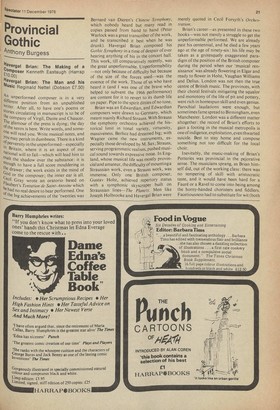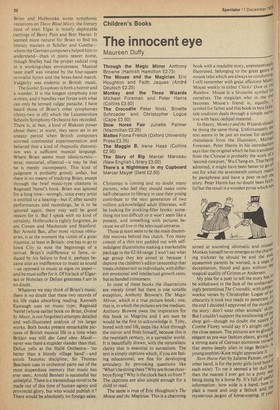Provincial Gothic
Anthony Burgess Havergal Brian: The Making of a Composer Kenneth Eastaugh (Harrap £10.00) Havergal Brian: The Man and his rviusic Reginald Nettel (Dobson £7.50) A.n unperformed composer is in a very different position from an unpublished "ter. After all, to have one's poems or stories circulating in manuscript is to be of the company of Virgil, Dante and Chaucer. The glamour of the press is dying; the day °f the xerox is here. Write words, and someeme will read you. Write musical notes, and Yt,.).1I may perish in dumbness. There is a kind el Perversity in the unperformed—especially In Britain, where it is an aspect of our national will to fail—which will lead him to exalt the shadow over the substance: it is enough to have a full score mouldering in the drawer; the work exists in the mind of God or the composer; the inner ear is all. Gray wrote an oratorio based on E1 Gray Tentation de Saint-Antoine which Ile had no real desire to hear performed. One of the big achievements of the 'twenties was Bernard van Dieren's Chinese Symphony, which nobody heard but many read in copies passed from hand to hand (Peter Warlock was a great transcriber of the work, and he transcribed it best when he was drunk). Havergal Brian composed his Gothic Symphony in a time of despair of ever hearing anything of his in the concert hall. This work, till comparatively recently, was the great unperformable. Unperformability —not only because of difficulty but because of the size of the forces used—was the essence of the work. Those of us who have heard it (and I was one of the brave who helped to subvent the 1966 performance) are content for it to revert to its dumb life on paper. Pipe to the spirit ditties of no tone. Brian was an Edwardian, and Edwardian composers were drawn to Germany, which meant mainly Richard Strauss. With Strauss the symphony orchestra achieved the historical limit in tonal variety, virtuosity, massiveness. Berlioz had dreamed big; with Wagner came the new instruments, especially those developed by M. Sax; Strauss, serving programmatic realism, pushed musical sound towards expressive noise. In England, whose musical life was mostly provincial and amateur, the difficulty of mounting a Straussian work, even a Strauss work, was immense. Only one British composer, Gustav Hoist, achieved repertory status with a symphonic skyscraper built on Straussian lines—The Planets. Men like Joseph Holbrooke and Havergal Brian were merely quoted in Cecil Forsyth's Orchestration.
Brian's career--as presented in these two books—was not merely a struggle to get the unperformable performed. We are already past his centennial, and he died a few years ago at the age of ninety-six: his life may be taken as a grotesquely exaggerated paradigm of the position of the British composer during the period when our 'musical renaissance' was already flowering in Elgar and ready to flower in Hoist, Vaughan Williams and Delius. London was not then the true centre of British music. The provinces, with their choral festivals mitigating the squalor and monotony of the life of pit and pottery, were rich in homespun skill and even genius. Parochial laudations were enough, but sometimes fame spread to Birmingham, even Manchester. London was a different matter altogether: the record of Brian's efforts to gain a footing in the musical metropolis is one of indigence, exploitation, even thwarted suicide. Best to stay home and compose something not too difficult for the local choir.
Inevitably, the music-making of Brian's Potteries was provincial in the pejorative sense. The musicians sprang, as Brian himself did, out of the working class: there was no tempering of skill with aristocratic taste, and it would have been hard for a Faure or a Ravel to come into being among the horny-handed choristers and fiddlers. Facetiousness had to substitute for wit (both Brian and Holbrooke wrote symphonic variations on Three Blind Mice); the literary taste of even Elgar is mostly deplorable (settings of Barry Pain and Bret Harte). It seemed more natural for Brian to find his literary masters in Schiller and Goethewhom the German composers helped him to understand—than in poets nearer home, though Shelley had the proper radical ring in a working-class environment. Musical taste itself was vitiated by the four-square revivalist hymn and the brass-band march. Vulgarity was endemic in British music.
The Gothic Symphony is both a horror and a wonder. It is the longest symphony ever written, and it handles vast forces with what can only be termed vulgar panache. I have heard those of Brian's other symphonies (thirty-two in all) which the Leicestershire Schools Symphony Orchestra has recorded. There is, at best, a kind of Blakean power about them; at worst, they seem set in an uneasy period when British composers scorned continental experimentation and believed that a kind of rhapsodic diatonicism was a sufficient musical language. Where Brian seems most idiosyncratic— terse, mercurial, elliptical—it may be that he is merely incompetent. This kind of judgment is probably grossly unfair, but there is no means of studying Brian, except through the brief music-type citations in Reginald Nettel's book. Brian was ignored for a long time—wrongly, since every artist is entitled to a hearing—but if, after sundry performances and recordings, he is to be ignored again, there may well be good reason for it. But I speak with no kind of certainty. Holbrooke is rightly forgotten, as are Cowen and Mackenzie and Stanford. But Arnold Bax, after most vicious obituaries, is at the moment the victim of a great injustice, at least in Britain: one has to go to Iowa City to note the beginnings of a revival. Brian's indifference to fame, induced by his failure to find it, perhaps became also an indifference to music as sound —as opposed to music as signs on paper— and he must suffer for it. Of his lack of Elgarian or Holstian or Delian greatness I am in no doubt.
Whatever we may think of Brian's music, there is no doubt that these two records of his life make absorbing reading. Kenneth Eastaugh uses no music type; Reginald Nettel (whose earlier book on Brian, Ordeal by Music, is not forgotten) attempts detailed and well-illustrated analysis of his larger works. Both books present remarkable pictures of British musical life in a time when Britain was still das Land ohne Musiknever was there a stupider slander than that. Delius yells at the Halle Orchestra—'no better than a bloody village band'—and extols Teutonic discipline; Sir Thomas Beecham cues in orchestral parts out of the most stupendous memory that music has ever seen; Arnold Bennett is successful but unhelpful. There is a tremendous novel to be made out of this time of human agony and provincial glory, but who would publish it ? There would be absolutely no foreign sales.



































 Previous page
Previous page